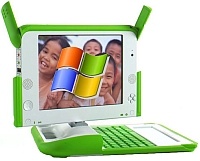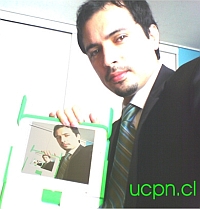I think we can all agree that the topic of whether Microsoft software should be running on the One Laptop Per Child X0 machines is currently a good trigger for extensive discussions. I myself have previously commented on this issue and other posts by Jon and Wayan have covered different angles to the story. The comments on this story also quickly turned into a debate about Windows on the X0.
Why is this issue such a hotly debated one? Is this just the natural extension of the Windows vs. Linux, Good vs. Bad, Open-Source vs. Closed-Source, Geek Culture vs. Corporate Greed, etc... discussion that has been raging on the desktop for so many years? A discussion which manages to survive on surprisingly few solid arguments and generally tends to be a very emotional one.
We have previously presented several different opinions and angles on this topic but last night I realized that there was one aspect which we hadn't mentioned even though it came up in a comment by one of our readers. Collaboration. Collaboration is at the very heart of the OLPC project.
Whether you're looking at the principals behind their concepts of how education should work or how the activities for Sugar are written. Their website is a Wiki which in this day and age is probably the best proof that collaboration can work very well for content production. Every piece of software running on the X0 machines has collaboration built into its very heart (or is at least supposed to) and content sharing is a fundamental aspect in how that system is supposed to be used.
Even very basic technologies like the OLPC Journal are often based on ideas conceived by a global community of coders, in this example Bryan Clark. And while the way the OLPC organization communicates its concepts, goals and methods are certainly up for debate they generally do a more than adequate job when it comes to keeping everyone informed on what they're doing.
Microsoft does the very opposite of what's written in the paragraph above. We simply don't know whether the company is interested in anything more than selling several million copies of its $3 Software Package for Developing Countries. It's very unlikely that any of the applications shipping with that package are open-source or written by anyone who's not working in Redmond.
Microsoft has a website for their Microsoft Unlimited Potential - Community Technology Skills Program but it doesn't really contain useful information. Given the lack of communication (apart from the occasional press-release) we simply don't know what kind of software the company plans on installing on the X0@XP systems.

1GB of flash-memory is very little once you start installing Windows XP Starter Edition, Microsoft Office Home and Student 2007, Microsoft Math 3.0, Learning Essentials 2.0 for Microsoft Office, and Windows Live Mail desktop (which combined make up the $3 "Microsoft Student Innovation Suite"). So it's obvious that for the X0 machines Microsoft will have to find some sort of compromise.
I'm also very skeptical when it comes to actual collaboration for the children using WinXP on the X0s. So far I haven't seen Microsoft release any piece of code that would really make that collaboration easier. (To be fair OLPC's software also hasn't been tried and tested, but at least they're working on it.)
What about Anti-Virus software or Firewalls to counter the potential security issues, will Microsoft include them for free? What about the school servers, will Microsoft allow them to run on whatever software solution the OLPC foundation comes up with or will schools be forced to purchase licenses of Windows Server 2003? Will the company provide free versions of Encarta in order to compete with the special offline-Wikipedia version that OLPC currently plans to include with the X0 infrastructure?
To cut a long story short: Regardless of all the emotional arguments raised in the discussions mentioned at the beginning of this post I personally don't believe that Microsoft is really able to provide a viable alternative to Sugar. At least not at this point.



> I personally don't believe that Microsoft is really able to provide a viable alternative to Sugar.
It hardly matters what we personally believe. It has already been reported that Microsoft has Windows running on the XO.
As for Bender's recent interview to the effect that they're not actively working with Microsoft ... that sounds like semihonest damage control and not a source of solace. "We added the SD slot for Bill" - Negroponte.
Getting a piece of software to "run" on hardware where all the drivers are open-source isn't all that hard, especially if you're a large entity such as Microsoft.
Taking an existing, 6 year old operating system and basically adapting it to make the most of the X0's specialised hardware (with certain limitations, e.g. amount of mass-storage) *and* making it a suitable tool for children and education, that's the real challenge.
And in that area Sugar is currently way ahead of anything that Redmond has demonstrated so far.
P.S. I of course acknowledge that it's up to discussion what a "suitable tool" is...
Not sure if you guys read this report (just published a few minutes ago). It's from Ars Technica's Ken Fisher:
'According to Walter Bender, president of Software and Content at OLPC, there is no agreement in place between OLPC and Microsoft to offer XO laptops with any version of Windows. Bender also indicated that Microsoft has not contacted OLPC regarding its $3 software bundling program, nor have any governments requested that the XO be outfitted with Windows. In short, there is no existing collaboration between Microsoft and OLPC aimed at outfitting the XO laptop with Windows.
"We are a free and open-source shop. We have no one from OLPC working with Microsoft on developing a Windows platform for the XO. MS doesn't get any special treatment from OLPC," Bender told Ars.'
http://arstechnica.com/news.ars/post/20070502-olpc-project-clarifies-no-plans-for-windows-support.html
Have a nice day,
Luis
ChristophD,
You raise an interesting idea. While XP on the OLPC is theoretically possible, is there any proof it can be done? Has anyone actually run Windows XP on the Children's Machine?
Until we see the Start Menu live on an OLPC computer, could all this be just conjecture?
There seem to have been earlier projects where XP could run on flash.
We can expect that a crippled version of XP embeded should be able to run on the OLPC. Whether it will be fast and useful is another question.
What remains a mystery is how MS have planned to protect the 2b1/XO's against malware, physical, and identity theft. The prospect of XO's only protected by a password in the hands of children is too horrible for words (what would a robber do to get a password from a child?).
Furthermore, we do not have any experience with XP on a mesh network. Would internet access be available over the mesh network?
Also, there is no collaborative software on the 3$ disks. The number of processes and open windows is intentionally limited (would speed up the OS) and networking is limited too.
If the XOs are not collaboratively networked, they are useless in schools.
And how would XP on the XO play with the services offered by Google and RedHat? These companies have spend real money and effort to support the OLPC. MS have only tried to convince people NOT to support the project. Would XP mesh or even talk with laptops running Sugar? (I don't think so)
In my personal opinion, little can be learned from Microsoft software. My guess is that the 3$ XP disks are just ment to kill Linux on the OLPC, even if that would mean killing the OLPC itself.
Winter
Mesh networking on Windows? Please, how hard could it be, considering that on the XO it runs entirely as proprietary firmware of the Marvell chip?
If Sugar turned out to be useful, it could be run on Windows too. python and gtk are reasonably portable.
Yes, Sugar could run on XP, but what would be the advantage over linux? And there would be lots of disadvantages, as pointed out above.
Anonymous, I think you're missing the point here...
It's not hard for Microsoft to copy any *single* feature of the Sugar software. But in my opinion it's damn hard, if not impossible, to really integrate all those features into their existing Windows XP code.
In this case coming up with a specialised software solution that's aimed at the specific hardware-platform and usage-environment is a much better way than trying to adapt 6 year old code that was meant to be used on off-the-shelf hardware in homes and offices around the world.
Plus, as Eduardo points out, the Windows platform does come with lots of disadvantages that haven't been addressed up to now!